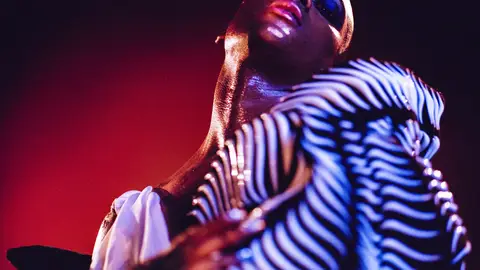Lotic Finds Their Power on Debut Album

When we connect via Skype, the voice of J’Kerian Morgan, better known as Lotic, struggles to punctuate the static dribble of a slow internet connection. It's an apt metaphor for Power, the Berlin-based producer’s debut album released July 13. Throughout, tension simmers between the organic and the postindustrial: a flock of strings ascend a cavernous club beat, horns fade into shrill Psycho-like tremors, and celestial bells twinkle over serrated gears. Like a hand in the dark, Morgan's voice occasionally cuts through the tension, demanding to be heard.
"With electronic music, it's so hard to get ideas across without using words. You always have to talk about it afterward," says Morgan, whose EP’s Agitations and Heterocetera articulated their frustrations with the electronic club scene’s homophobia, racism, and misogyny purely through sound. "I just found a way to not shut down that dialogue, but to get in front of it."
On "Hunted," Power’s lead single, the 29-year-old sounds like they’re gearing up for battle. (Per an announcement this year, Morgan uses they/them pronouns, and "she if you nasty.") "Brown skin, masculine frame / head's a target / actin' real feminine / make 'em vomit," they whisper as a big band beat, by turns celebratory and caustic, descends around the mantra. Their delivery is gentle yet clear: stepping into their agency as a black femme casts them as a site of ridicule and violence. But in the video, Morgan's the hunter. In an ode to Aaliyah’s Queen of the Damned, wearing a fringed women's slip, heavy mascara, and sparkly lipstick, they drag a conventional white boy into the moonlit ocean, a playful inversion of power.
Power was created during a period of instability. After moving from Texas to Berlin in 2012, they found their footing in the city’s experimental music scene, DJing sets that subverted R&B, noise, and ballroom culture to their most heightened, apocalyptic extremes. But it was their 2014 mixtape Damsel in Distress— which in part reworked isolated vocals from Beyoncé’s “Drunk In Love” into an ominous vortex of sound— that garnered Morgan wider recognition, leading to representation from the influential label Tri Angle Records.
But in 2016, this momentum was disrupted by a series of setbacks: an unexpected eviction—"I had ten minutes to pack my shit," they recall. "I was supposed to be finishing this record and I was homeless overnight."—followed by a break up and an assault at a bar. They took a hiatus from music and contemplated quitting, spiraling into a period of "depression and confusion."
This period of pain, and the vulnerability that ensued, compelled Morgan to incorporate their voice onto the record.
"I had to really really start relying on my friends during that time, so communication and being very clear about my emotions became super important," they say. "Through that process, I was like musically I have to do this, too. Otherwise, I’m being dishonest."
Reading Ta-Nehisi Coates’ book, Between The World and Me, also informed their open-hearted approach to the record.
"I just had never heard words from a straight black man of encouragement, the perspective of 'Here son, are all the tools you’re going to need to navigate this shitty world,'" they say. "Everything about it was so beautiful and honest and raw and I just really, I cried so much reading that. I didn’t know that existed."
The album explores this new outlook mostly through armored compositions of sound, but it's Power’s closer, "Solace," that finds Morgan's at their most revealing.
"It's gon' be ok," they sing, stretching the syllables over airy synths. "Now I can just be / How I feel, who I see / Nothing scares me / Just gon' be me for me."
"I thought this [record] was for other people, but I ended up needing it for myself," says Morgan. "I needed those affirmations more than I realized."





